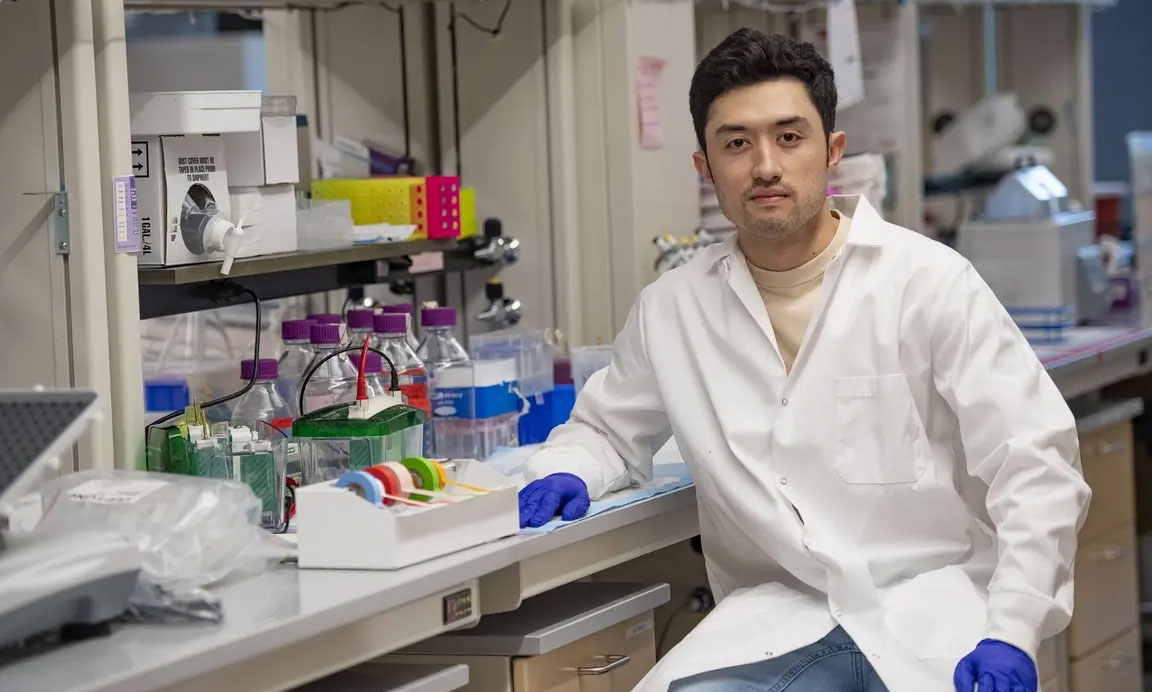Class of 2023: Santiago Lopez immigrated to the U.S. at a young age. At VCU, he excelled in STEM and won a prestigious NSF fellowship

Lopez, who is graduating from the College of Engineering with a degree in biomedical engineering, will next pursue his Ph.D. at Vanderbilt University.
Santiago Lopez and his family immigrated to the United States from Colombia when he was 4 or 5 years old. As he was learning English, Lopez read Disney’s “My Very First Encyclopedia of Animals.” He can still recall the vibrant colors, images and descriptions of how the animals would mature and interact in their respective environments.
“I found it really interesting how diverse and different each animal was to one another from appearance to habitat, and that sparked a curiosity to learn more and eventually lead me to STEM,” Lopez said.
The book ignited Lopez’s passion for STEM that he still carries today as a graduating Virginia Commonwealth University student.
“My family didn’t have much when we were growing up, as the first jobs my parents could get was as a maid and a janitor,” he said. “But their strong work ethic proceeded throughout and was instilled in me throughout my childhood and college career.”
That work ethic landed Lopez at the Mathematics and Science High School at Clover Hill, where he studied advanced biology, chemistry, physics, mathematics and programming. And next month, he receives his degree in biomedical engineering from the College of Engineering.
He will graduate as a recipient of the 2023 National Science Foundation Graduate Research Fellowship, which supports STEM graduate students for three years with a stipend of $37,000 each year and an additional $12,000 to help cover tuition.
The grant will help support his research as a doctoral student at Vanderbilt University, which he will attend in the fall. His research — looking at the tumor environment and how its environment triggers cancer metastasis — builds upon his work at VCU as an undergrad. During this time, he received two years of funding from the National Institutes of Health via the VCU Center on Health Disparities’ Initiative to Maximize Student Development.
Lopez’s current research focuses on looking at cell-to-cell junctions and how altering these junctions affects the cells’ behavior — an interest that a VCU biomaterials class helped solidify.
“I was really interested in cellular interactions to different materials and implants and how our immune system responds to these different phenomenons,” he said. “Everything just clicked for me in that class and I had an amazing teacher — [Jennifer Puetzer, Ph.D.] — that not only explained the concepts really well but also challenged us to think of solutions for problems currently in the world.”
Lopez also credits professors Daniel Conway, Ph.D., and Priscilla Hwang, Ph.D., with challenging him to become a better scientist and engineer while he was doing research in their labs. In addition, they guided him throughout his undergraduate journey with advice on internships, research opportunities and graduate schools.
The summer after his sophomore year, Lopez investigated cancer heterogeneity in breast cancer cells at Vanderbilt as part of the NSF Research Experiences for Undergraduates. The next summer, he served as a sensor research and development intern at Medtronic Diabetes in Los Angeles.
The latter opportunity came about through his affiliation with the Society of Hispanic Professional Engineers, of which he was a member for four years and served on the executive board for two.
“[The Society of Hispanic Professional Engineers] helped me immensely in my professional development through the opportunity to go to their national conference, where I got my internship, and their workshops in preparation for the conference in terms of interview preparation and elevator pitches,” Lopez said. “Especially being a first-generation college student where I was never introduced to these skills, I learned how to be successful in a professional setting.”
Additionally, the organization helped keep the Hispanic culture concept of familia close to his heart. The social events have enabled him to remain close with fellow members and give back. Each spring, the group hosts a volunteering event, Dia De Ciencias, when members introduce STEM activities to English-as-a-second-language high school students and their families.
“My experience at VCU engineering has had its ups and down, but overall it helped give me the toolbox necessary to solve today’s biggest problems,” Lopez said. “VCU engineering sculpted me to become the best engineer and scientist that I could be.”
Categories Biomedical Engineering, Student Stories, Undergraduate Student Stories